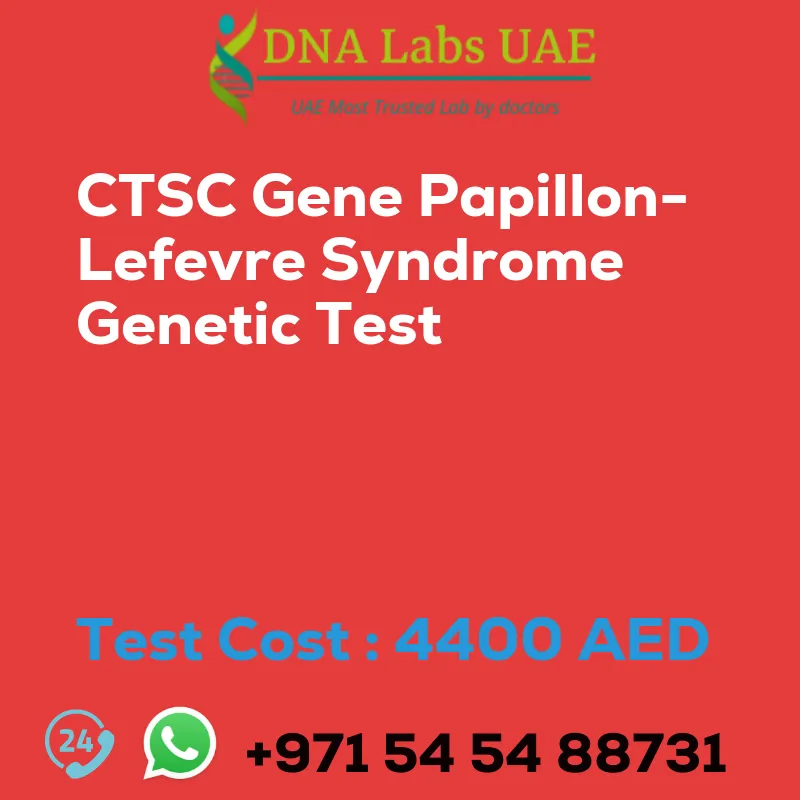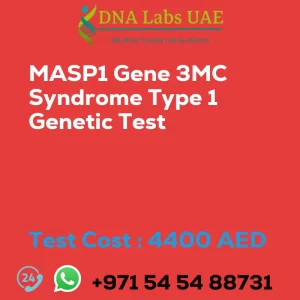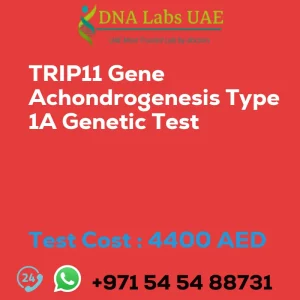CTSC Gene Papillon-Lefevre syndrome Genetic Test
Test Name: CTSC Gene Papillon-Lefevre syndrome Genetic Test
Components: Blood or Extracted DNA or One drop Blood on FTA Card
Price: 4400.0 AED
Sample Condition: Blood or Extracted DNA or One drop Blood on FTA Card
Report Delivery: 3 to 4 Weeks
Method: NGS Technology
Test type: Osteology Dermatology Immunology Disorders
Doctor: Dermatologist
Test Department: Genetics
Pre Test Information: Clinical History of Patient who is going for CTSC Gene Papillon-Lefevre syndrome NGS Genetic DNA Test. A Genetic Counselling session to draw a pedigree chart of family members affected with CTSC Gene Papillon-Lefevre syndrome NGS Genetic DNA Test gene CTSC
Test Details:
CTSC gene Papillon-Lefevre syndrome NGS genetic test is a diagnostic test that uses Next-Generation Sequencing (NGS) technology to analyze the CTSC gene for mutations associated with Papillon-Lefevre syndrome (PLS). Papillon-Lefevre syndrome is a rare autosomal recessive genetic disorder characterized by palmoplantar keratoderma (thickening of the skin on the palms and soles) and severe periodontitis (inflammation and destruction of the gums and teeth). The condition typically presents in early childhood and can lead to tooth loss by the age of 5-6 years. The CTSC gene, located on chromosome 11q14.2, provides instructions for producing an enzyme called cathepsin C. Mutations in this gene impair the function of cathepsin C, leading to the accumulation of certain proteins and the development of PLS.
NGS technology allows for the simultaneous analysis of multiple genes, including the CTSC gene, in a single test. By sequencing the entire coding region of the CTSC gene, NGS can identify both known and novel mutations that may be responsible for PLS. The CTSC gene Papillon-Lefevre syndrome NGS genetic test is typically ordered for individuals with symptoms suggestive of PLS, such as palmoplantar keratoderma and severe periodontitis. It can help confirm the diagnosis and provide information about the specific genetic mutation causing the condition.
The test involves obtaining a blood or saliva sample from the individual, isolating the DNA, and subjecting it to NGS analysis. The results are then interpreted by a geneticist or genetic counselor, who can provide information about the specific mutation identified and its implications for the individual and their family. Genetic testing for Papillon-Lefevre syndrome can help with early diagnosis, appropriate management, and genetic counseling for affected individuals and their families. It can also aid in prenatal diagnosis for couples at risk of having a child with PLS.
| Test Name | CTSC Gene Papillon-Lefevre syndrome Genetic Test |
|---|---|
| Components | |
| Price | 4400.0 AED |
| Sample Condition | Blood or Extracted DNA or One drop Blood on FTA Card |
| Report Delivery | 3 to 4 Weeks |
| Method | NGS Technology |
| Test type | Osteology Dermatology Immunology Disorders |
| Doctor | Dermatologist |
| Test Department: | Genetics |
| Pre Test Information | Clinical History of Patient who is going for CTSC Gene Papillon-Lefevre syndrome NGS Genetic DNA Test. A Genetic Counselling session to draw a pedigree chart of family members affected with CTSC Gene Papillon-Lefevre syndrome NGS Genetic DNA Test gene CTSC |
| Test Details |
CTSC gene Papillon-Lefevre syndrome NGS genetic test is a diagnostic test that uses Next-Generation Sequencing (NGS) technology to analyze the CTSC gene for mutations associated with Papillon-Lefevre syndrome (PLS). Papillon-Lefevre syndrome is a rare autosomal recessive genetic disorder characterized by palmoplantar keratoderma (thickening of the skin on the palms and soles) and severe periodontitis (inflammation and destruction of the gums and teeth). The condition typically presents in early childhood and can lead to tooth loss by the age of 5-6 years. The CTSC gene, located on chromosome 11q14.2, provides instructions for producing an enzyme called cathepsin C. Mutations in this gene impair the function of cathepsin C, leading to the accumulation of certain proteins and the development of PLS. NGS technology allows for the simultaneous analysis of multiple genes, including the CTSC gene, in a single test. By sequencing the entire coding region of the CTSC gene, NGS can identify both known and novel mutations that may be responsible for PLS. The CTSC gene Papillon-Lefevre syndrome NGS genetic test is typically ordered for individuals with symptoms suggestive of PLS, such as palmoplantar keratoderma and severe periodontitis. It can help confirm the diagnosis and provide information about the specific genetic mutation causing the condition. The test involves obtaining a blood or saliva sample from the individual, isolating the DNA, and subjecting it to NGS analysis. The results are then interpreted by a geneticist or genetic counselor, who can provide information about the specific mutation identified and its implications for the individual and their family. Genetic testing for Papillon-Lefevre syndrome can help with early diagnosis, appropriate management, and genetic counseling for affected individuals and their families. It can also aid in prenatal diagnosis for couples at risk of having a child with PLS. |








